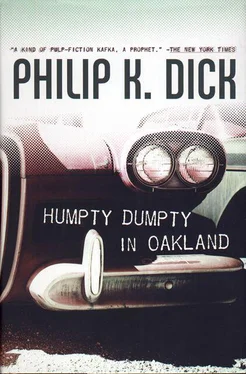“I see,” Fergesson said, not following the man’s talk.
“I’d like to meet one of these science fiction boys. I’d hire myself out as a technical consultant.” Carmichael’s great horse-teeth showed in irony. “Ten or fifteen percent of the price he gets. This stuff is just fake. They fake it as they go along. This one here,” he said, lifting the book around so that Fergesson could see it. “This is about the I.Q. of everybody going up overnight.” He laughed suddenly, a loud startling noise. “Animals become as smart as people. You ever read this stuff?”
“No,” Fergesson said. He was impatient to go on; he walked to the door of the office and looked out at the half-completed houses.
“What do you do with cars?” Carmichael asked from the desk.
“Fix them. I have a garage. In Oakland.”
“What part of Oakland?”
“San Pablo Avenue,” he said, and opened the door to go outside.
Carmichael pushed back his chair and followed after him. His hand descended on Fergesson’s shoulder. “You say you want to go look around?” He started down the gravel path beside Fergesson. “Well, I’ll show you around.”
“Thanks,” Fergesson said. Straining, he saw the flat tract at the bottom of the hill; a muddy path went down and across a deep ditch, past heaps of pipe and piled lumber. Separate crews worked laying foundations. A cement mixer churned and the echoing racket of a hammer stirred the midday air. The air smelled of fresh-cut wood.
“Pretty nice,” Carmichael said, stopping to light a cigarette. He tossed the match a long distance off. “Don’t you think, so, Jim?”
“Yes,” Fergesson said.
They worked their way down the path. Under their feet clumps of dirt rolled and Fergesson tottered as his heels slid in the ooze. “Watch your step,” Carmichael said from behind him. He himself descended with calm. “No, Bradford doesn’t come out here. You see, Jim, I’ll tell you how this thing works. Bradford has nothing to do with the building. They put up the money and Gross and Duncan do the work. The selling is handled by two or three agents. Now the deal I have is, I live here on the tract. I get one of the houses rent-free for the first year or until the tract fills up. For each house I sell I get a flat five hundred dollars. Other than that I get no salary. But all I have to do is sell two houses a month. You can see my house. It’s a show house. Full of department-store furniture and an electric kitchen completely equipped. My wife’s there.” He pointed and Fergesson could see curtains in the windows of the house. It was a one-story California ranch-style house with a garage and a picket fence and a lawn bordered by flowers. The cement walk led to the mire of dirt that was the street. All the other houses were unfinished, unpainted and empty. Their skeletons were identical. He saw no variation along the rows.
“There’s four different styles,” Carmichael said. “But right now you can’t see the difference. It’s in the color and the lattice work and the number of bedrooms.”
“I see,” Fergesson said.
“Over there will be the shopping center.” Carmichael gestured. “That’s a separate enterprise. They think it’s too much of a gamble. They want it operated on its own. They’re sure the houses will go, but the shopping center is something else.”
“Why?” Fergesson said. “People have to buy, and they live out here.”
“They live here,” Carmichael agreed, “but did you ever see a woman that wanted to buy near home? The ladies want to go into town. They won’t buy here; they’ll drive to San Francisco. It’ll give them an excuse to go to the big downtown department stores. Maybe a food market here. A market and a gas pump and a lunch counter. But they’re talking in terms of—” He spread his arms.
“Bakeries, and pottery shops, and circulating library, and shoe repair.
“A town,” Fergesson said.
Carmichael glanced at him. “The works, yes.”
“You don’t think it’ll pay?”
“Well, they don’t need it.”
“They’re not risking anything.”
“No,” Carmichael agreed, “they’ll leave it on its own. If it sinks they’ll be free.”
“The garage,” Fergesson said. “I was thinking about buying into that.”
Carmichael was still looking at him and Fergesson knew that he had been figured out from the start. The man had appraised him; that was his job. Fergesson walked across the flat ground. When he reached a group of workmen he halted. They were setting frames for concrete to be poured, for the foundations of the house.
“Well,” Carmichael said, beside him. “It would cost you forty or fifty.”
“Yes,” Fergesson said.
“What about this garage in Oakland?”
“I sold it. I’m selling it.”
“Why?”
Fergesson did not answer. He felt tense and disturbed and he walked away from Carmichael with his hands in his pockets.
After a while Carmichael followed him. “Let’s go back to the office,” he said. “We can talk.”
Fergesson said, “What do you get for these?” He meant the houses.
“Twelve or fourteen. They’re good. Nothing special but they’re well built. Gross and Duncan know their business. Nobody’s getting swindled.” Carmichael ground his cigarette out in the mushy soil. “At one time I was thinking about the auto thing. The supply shop; me, I mean. But they want people to buy in to get in on that. I couldn’t raise that. When they talk that kind of money, I’m out. They’re sound enough on this auto business. The people who live this far out won’t be getting into town for their auto parts and work; they’ll have it done here because when they need it they’ll need it right away.”
“That’s what I figured,” Fergesson said, and he thought then of something else. “The women won’t be going to the garage. The men bring in the car.”
“How long have you been in the garage business?”
“Most of my life.”
“How do you like it?”
“It’s okay.” He felt impatient. “A lot of hard work crawling under cars.”
“You like what you see here?”
“Yes,” he said.
“It’s a damn funny thing,” Carmichael said. “Come on, let’s go back.” He guided Fergesson with his arm and the two men walked toward the ditch and the rise. “People come out here, drive all the way from the City . . . they know it isn’t finished; they know the freeway isn’t done and the houses aren’t either, and when they get out here they look around and bellyache—like— hell. What do they want, for Christ’s sake? I can see this place; all you have to do is look. In two or three years this’ll be lawns and wives out watering and kids crawling everywhere. What do they need? These places look alike—so what; they won’t look alike when people get in them. It’s the people that makes them look different. You take any six blocks of empty houses; it’s scary. The people bring in the personal furniture and hangings.”
“How many houses have you sold?” Fergesson said.
“Six. Seven. There’s other salesmen, back in the City.” They crossed the ditch and halted so that Fergesson could get his breath. “Would you bring anybody else in with you?” Carmichael asked.
“No.” He was panting again with the exertion of climbing. To excuse himself, he looked back at the houses to see them once more before they took the rise. “I could run it alone, the financial part.
“But you’d hire mechanics.”
“Yes,” Fergesson said.
“You’re married? You have a family?”
“Yes,” he said.
Carmichael started leisurely up the hillside and Fergesson followed. The old man’s shoes disappeared into the yellow clay, and the grass, as he clutched for support, slid through his fingers. Carmichael climbed upright, with ease and sureness, talking slowly.
Читать дальше










